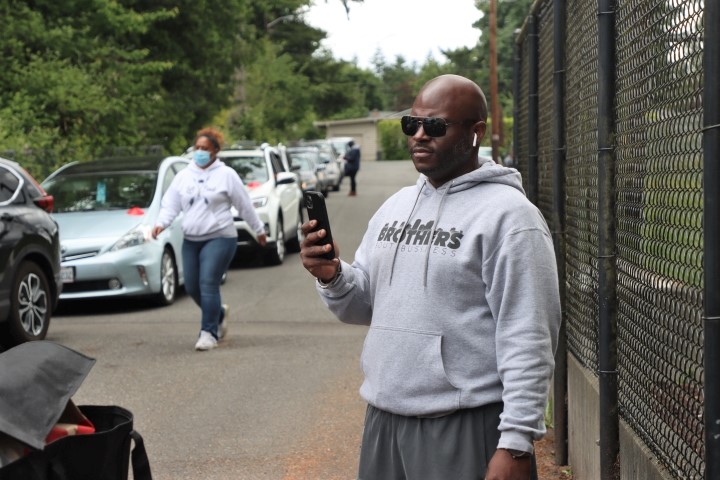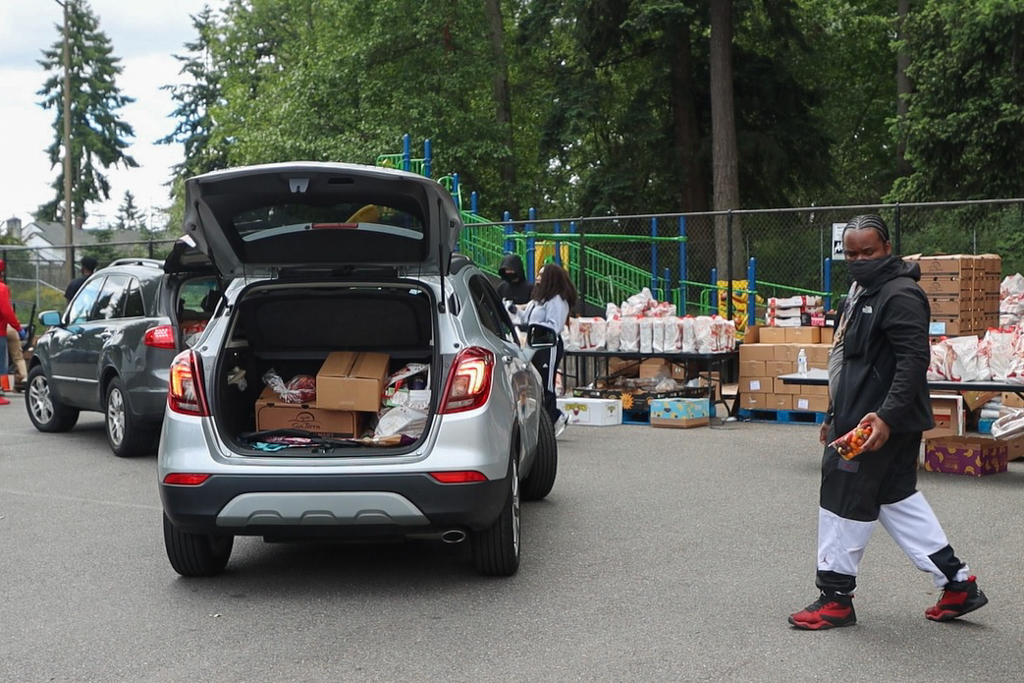Breaking Barriers Through Food
Louis Guiden is pretty optimistic and hopeful these days, despite what has happened in the 15 months since COVID-19 hit our region in spring 2020.
He and his wife saw the inequities in education, family supports and housing well before the coronavirus landed in Washington in early 2020. There was also a lack of funding for Black, Indigenous and people of color-led community-based organizations. Economic development and a host of other challenges were also underfunded.
Seeing how Black youth were being pushed out of their education and into the school-to-prison pipeline, in 2008 Guiden founded Good Shepherd Youth Outreach, an organization that provides mentoring and interventions on behalf of young people of color in Federal Way. United Way of King County supports Good Shepherd’s work to help youth reengage with their education.
Bringing People Together with Food
While the pandemic exposed the deep, endemic racial inequities that have existed across the region and nation, it also gave Guiden a different perspective about community. He said it has led to better understanding among different racial, ethnic and cultural communities that previously were wary of each other.
The pandemic led to an increase in food insecurity due to the economic collapse caused by the shutdowns. Guiden realized his organization needed to fulfill a need in the community, so he launched Feeding Our Community in April 2020 to distribute food at the Boys and Girls Club in Federal Way using a “drive-through” system to maintain social distancing guidelines.

Since then, over 120 cars line up in the driveway and out onto the street every Thursday morning to receive food that will feed a family for a week. Guiden said over 1,600 households per month receive healthy allotments of food.
“Folks are coming to our food distribution site because they say we look like them. The food we’re giving them is food they want to eat,” Guiden said. But, he added, “Food insecurity has always been a problem. The pandemic has exposed what was already there—it was just hidden.”
“We’ve seen a lot of healing, relationship building. We see people coming around smiling now, feeling hopeful, grateful.”
Louis Guiden
Guiden said his efforts to help families who need food have yielded “amazing” results. “The one thing about Black and brown communities, food is how we come together,” he said. “We’ve seen a lot of healing, relationship building. We see people coming around smiling now, feeling hopeful, grateful.”
Guiden said the Feeding Our Community program has brought communities from different races, ethnicities and cultures together and has broken barriers. Many members of those communities have come in to support Good Shepherd’s work.
For example, he said Hispanic families bring homemade tacos and tamales. He added that members of the Polynesian and Filipino communities also bring food to support the youth and staff who are serving at the site.
“We have been seen how people appreciate us as a Black-led organization, reaching out to serve and support them, and, in return, they’re serving and supporting us,” Guiden said.
“We don’t want to keep feeding. We want to go from a betterment model to a development model. We should see food insecurity going down because people have livable wages, jobs, careers, education.”
Louis Guiden
“We’ve gone thru so much—the Black and brown community has gone through so much over the last year,” Guiden added. “And, if we survive that, we can come together now and support each other without white, mainstream organizations trying to lead the work. We’re leading the work now.”
One of the most positive aspects about the FOC is how cultural lines have been crossed because nutritional needs have grown across cultures. Guiden said the need also has forced people from other cultures, like Russian and Ukrainian families, to reassess their biases about Black people.
Guiden said he doesn’t want to be providing food in two years. Instead, he wants to see the community thrive on its own.
“We don’t want to keep feeding. We want to go from a betterment model to a development model,” he said. “We should see food insecurity going down because people have livable wages, jobs, careers, education.”
“We’re seeing people of other ethnicities seeing us different. It has changed a lot of biases people had about Black people. And that’s how we deal with implicit bias.”
Louis Guiden
“It’s making people who come say, ‘Wait a minute, these are Black people? They’re not dangerous? They are here serving us? Wait a minute, we thought they were dangerous,'” Guiden said. “Now they come through, they laugh, their kids are speaking to us, so even that has removed barriers. We’re seeing people of other ethnicities seeing us different. It has changed a lot of biases people had about Black people. And that’s how we deal with implicit bias.”
A Volunteer-Led Effort
The food distribution effort is supported by mostly youth from the community. They help organize the boxes and bags of food and then put the packages in the cars’ trunks, minimizing contact to prevent the spread of the coronavirus.
One of the youth, Javontae, said he started helping out in the summer of 2020 after he graduated from high school. He is now a freshman studying film at Central Washington University. He said he heard about volunteering at the site from a friend.
“I wasn’t worried about the pay, I was more worried about helping the community because I’m about people, the community,” Javontae said. “That’s what I’ve always been about, helping people.”
Another youth, Isaiah, who also graduated from high school in 2020 and now attends Green River College, said he likes helping people and “do whatever I can to help out. It’s really big for me.” He added that the FOC brings everybody together, “like a family.”


Comments